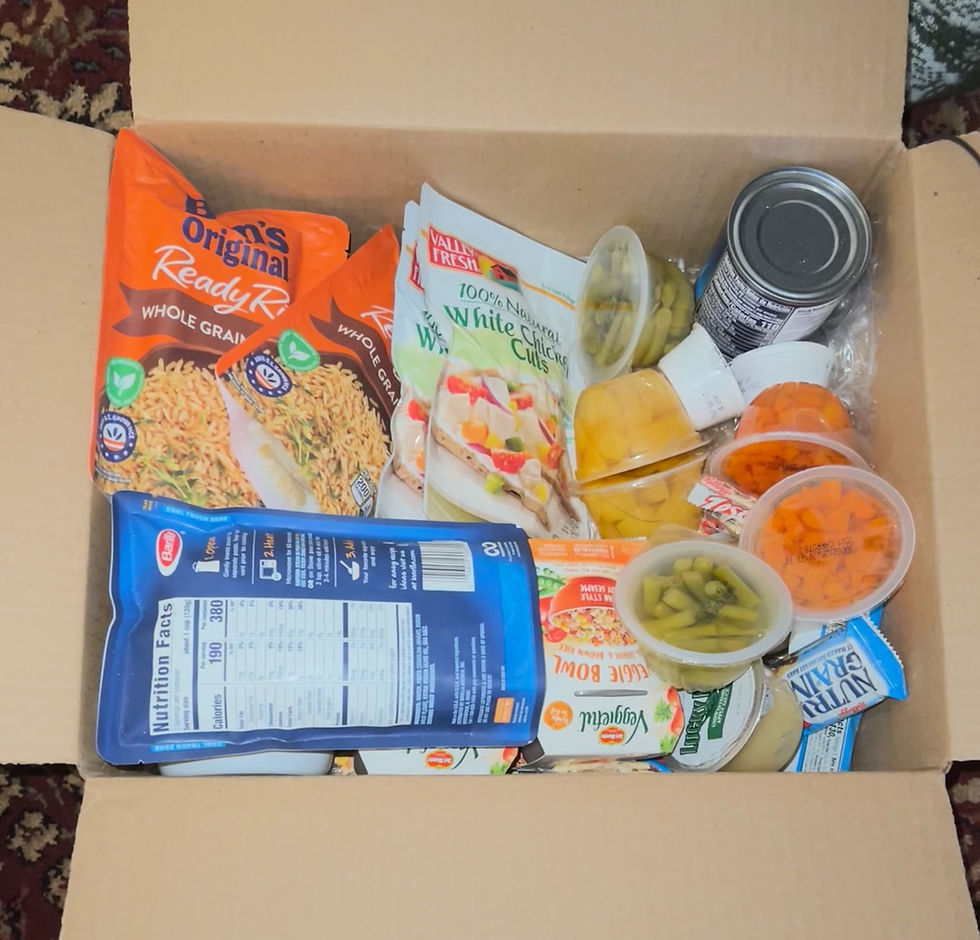Rx: Healthy meals improve diabetes
- readdswrite
- Feb 25, 2022
- 3 min read
Updated: Mar 24, 2022
Grab-n-go foods, muffins, bagels and bread used to be the typical diet for Shirley Fickett, a Westford, Mass., resident who has lived with Type 2 diabetes for 18 years. Through a clinical study, she's now learning how to properly fuel her body and shift her mindset in order to better manage her disease.
"I don't think I've bought bread since I started on this," said Fickett, who is 65. "I love bread. But I don't miss it."
Fickett is participating in the Food As MedicinE for Diabetes randomized clinical trial, funded by the National Institutes of Health and conducted by Massachusetts General Hospital and University of North Carolina at Chapel Hill.
The study is a part of the push by many dieticians and health policy workers for food to be viewed in a new way: as a form of medicine.

Five days' worth of personalized healthy meals are delivered to Fickett's doorstep each week. She also meets regularly with a research dietitian from Jamaica Plain's Community Servings, the nonprofit that provides her meals.
She will participate in the study for one year, with medically tailored meals provided for the first six months. For the second half of the study, Fickett will be responsible for making meals on her own that help manage her disease. Other participants are provided funds to purchase and prepare their own healthy meals.
"I was lucky to get into the food side of the clinical trial," Fickett said. "Because to eat as a diabetic, healthfully, for $30 a month, especially right now, is almost a joke."
In her first three months on the meal plan, Fickett lost about 14 pounds and her hemoglobin A1c, a measure of blood sugar levels, has decreased from 8.1 to 7.0.
"The research is showing that by providing access to medically tailored meals, in particular for individuals who need them, you are going to see improved health outcomes and lowered healthcare costs," said Katie Garfield, director of Whole Person Care for the Center for Health Law and Policy Innovation of Harvard Law School.
Her program evaluates policy changes in which the healthcare system would pay for nutrition interventions that "close the loop" between food access and diet-related diseases.
Community Servings’ director of food and health policy Jean Terranova described the program’s focus on overall health.
"We're not really trying to address hunger necessarily. We're really trying to address health," Terranova said. "Most of our clients are food insecure, in addition to being medically vulnerable. But the medical issue is first and foremost."
In determining which conditions are food related, the team considers when both food insecurity and nutrition impact the cause and progression of disease, as well as when food can play a part in treatment.
"Some [connections] are very clear, for example, Type 2 diabetes is heavily impacted by access to healthy foods," Garfield said. "But then there are less intuitive connections between nutrition and conditions like asthma … [and] depression."
Fickett has both asthma and depression, along with several other conditions including hypertension, thyroid disease, allergies and panic disorder.
She cannot currently exercise because she is awaiting a knee replacement. So, Fickett's success has resulted from the meal program alone.
"I'm like, 'Wow, you're down two pant sizes, you're feeling better, you have more energy, your mental health is better, you're approaching things differently,'" she said.
When she has the urge to stress eat, Fickett remembers two things to distract from her cravings. First, her commitment to the clinical trial, and, second, "the outrageous money that these [unhealthy] things cost."
"It's different, and it's my choice," she said. "When I overeat, I feel so lousy and exhausted that it's just like, 'I want to stay on this.'"
But Fickett said she fears what will happen when she no longer receives prepared meals.
"Do I revert back, or do I feel so good that I figure out a way to cook?"

She feels confident that she could find ways to recreate the healthy meals, but a major hindrance for her is that she "just [doesn't] like to cook."
"I know what I'm talking about. I sound like a dietitian," Fickett said. "A big key to my success and keeping the success going is how do I sustain it on my own?"
Through monthly lifestyle change coaching sessions, she is learning the skills and mindset needed to make that happen. But with the benefits that prior research has already shown, Fickett believes food as medicine services should become a standardized medical practice.
"We need to put more money into that as a whole nation," Fickett said. "Because diabetes is almost pandemic at this point."
Comments